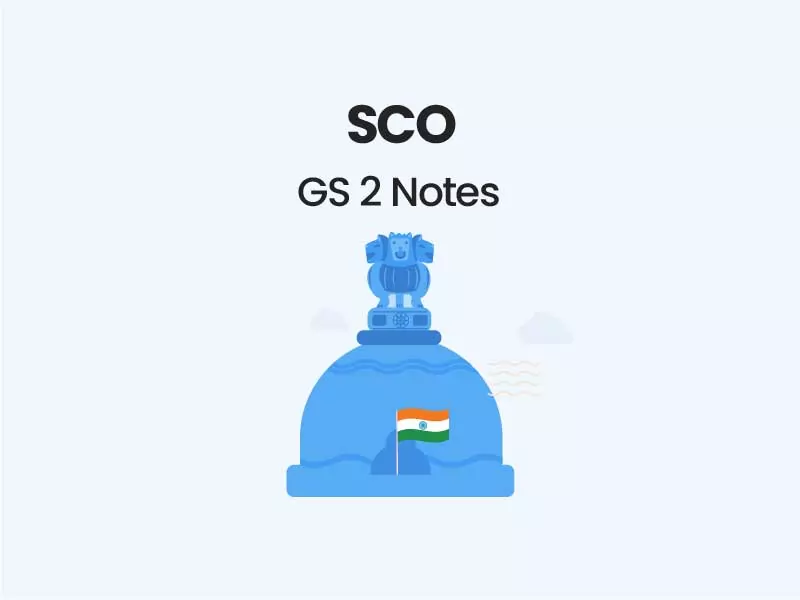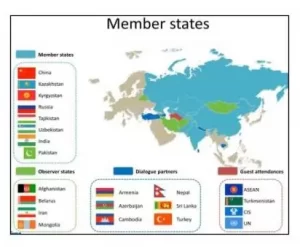
Shanghai Cooperation Organization -SCO
Shanghai Cooperation Organization – SCO is a Eurasian intergovernmental political, economic, and military organization founded in Shanghai in 2001 and headquartered in Beijing. The mains focus area of the group is Regional development and Security issues (terrorism, ethnic separatism, and religious extremism).
- SCO comprises 8-member states, India, Kazakhstan, China, Kyrgyz Republic, Pakistan, Russian, Tajikistan and Uzbekistan. It has 4 Observer States (includes Iran and Afghanistan) and 6 Dialogue Partners.

About SCO
SCO owes its origin to its predecessor “Shanghai Five”, which was a multilateral forum founded by 5 countries – China, Russia, Kazakhstan, Kirghizia, and Tajikistan, in Shanghai in 1996.
- Shanghai Five emerged from a series of border demarcation and demilitarization talks which the four former Soviet republics held with China to ensure stability along the borders, after the collapse of Soviet Union in 1991.
- Following the accession of Uzbekistan to the organisation in 2001, the Shanghai Five was renamed as the SCO.
India, along with Pakistan, became full-time members during the Astana summit in Kazakhstan in 2017. While Central Asian countries and China were not in favour of expansion initially, the main supporter of India’s entry in particular was Russia.
- A widely held view is that Russia’s growing unease about an increasingly powerful China prompted it to push for its expansion.
Working of the SCO is underpinned by the “Shanghai Spirit” which is about mutual trust, mutual benefit, equality, consultation, respect for cultural diversity and pursuit of common development.
Read Full GS Notes
Working Structure:
- Heads of State Council (HSC) – the highest decision-making body in the SCO.
- Heads of Government Council (HGC) – SCO’s second-highest body that deals with the grouping’s trade and economic agenda besides approving its annual budget.
- It has two permanent bodies – the SCO Secretariat based in Beijing and the Executive Committee of the Regional Anti-Terrorist Structure (RATS) based in Tashkent.
- SCO Business Council and SCO Interbank Consortium also work for increasing the cooperation among members for expanding economic cooperation and bank services respectively.
- SCO represents around 42% of the world’s population, nearly 20% of the global GDP and 22% of the world’s landmass.
- 4 of its members (India, Russia, China, and Pakistan) are nuclear powers and 2 (Russia and China) are permanent members of the UN Security Council (UNSC).
- Culture has become an important element of the SCO, attuned to the group’s search for an inclusive Eurasian identity.
SCO is part of India’s stated policy of pursuing “multi-alignments”. From the Indian perspective, the strategic and geographical space in which the SCO straddles are extremely important. The security, strategic, economic, and geopolitical interests are also closely intertwined with developments in this area.
Significance of Shanghai Cooperation Organization – SCO for India
Geostrategic significance – SCO will help India fulfil its aspiration of playing an active role in its extended neighbourhood as well as checking the ever-growing influence of China in Eurasia.
- Platform for India to simultaneously engage with its traditional friend Russia as well as its rivals – China, and Pakistan.
Security – SCO’s main objective of working cooperatively against the “three evils” of terrorism, separatism, and extremism is in consonance with India’s interests.
- Regular participation in Regional Anti-Terrorist Structure (RATS) and joint military exercises (India participated in 2018) will help enhance combat capabilities and intelligence sharing.
- SCO provides a platform for multilateral cooperation to tackle the menace of illegal drug trade emanating from ‘Drug Crescent’ (Iran-Pak-Afghan) and illegal arms trade in the region.
Connectivity – SCO is also a potential platform to advance India’s Connect Central Asia policy – through trade, people to people contact and cultural connect.
- This is much in line with India’s focus on connectivity through efforts like International North South Transport Corridor (INSTC) & Ashgabat Agreement, construction of Chabahar Port and setting up an air freight corridor between Kabul, Kandahar, and New Delhi.
Economic – With SCO countries contributing almost 42% of the world population and 20% of the GDP, the proposed FTA with Eurasian Economic Union can provide India with a wider market base for its IT, telecommunications, banking, finance, and pharmaceutical industries
- With cultural connect and shared history, it also has potential to boost tourism sector of the country (presently SCO countries constituted only 6% of India’s total tourists)
Energy Security – Being closer to India geographically, mineral-fuel trade with Central Asia can entail cost savings for India
- SCO countries along with Iran, Azerbaijan & Turkmenistan hold some of the largest oil (~25%) and natural gas reserves (~50%) of the world
- Kazakhstan is the largest producer of Uranium. Uzbekistan & Kyrgyzstan are important regional producers of Gold
- SCO membership could help advance talks on construction of stalled pipelines like TAPI & IPI.
Engaging with China – SCO provides a platform for strengthening Indo-China relations and resolving their existing disputes. Russia had played a role in reducing tensions between them after Galwan Valley clashes
Cooperation with Pakistan – SCO can be seen as an opportunity for the India and Pakistan to cooperate on issues of mutual interest without bringing in their bilateral disputes.
Challenges for SCO
Global Geopolitics – Along with BRICS, SCO is seen as an attempt by China & Russia to challenge the Western dominated global order and counterbalance the activities of United States and NATO in Central Asia.
- The growing proximity of Russia and China and India’s attempts towards better relations with the US makes the organization vulnerable to competitive geopolitics.
China’s Belt and Road initiative – India’s position on BRI is contrary to other members, all of which have supported the initiative.
Definition of terrorism – India’s definition of terrorism is different from the definition of SCO under RATS.
- For SCO, terrorism coincides with regime destabilization, whereas for India it is related to state-sponsored cross border terrorism.
- SCO’s targets are groups like East-Turkestan Islamic Movement (ETIM) and Al-Qaeda, whereas groups like Lashkar-e-Taiba, Jaish-e-Mohammad and Harkat-ul-Mujahideen, operational in India, do not come under the ambit of the SCO anti-terror structure.
Other regional organizations – proliferation of other regional undertakings like Eurasian Economic Union (EAEU), Belt and Road Initiative (BRI), Greater Eurasian Partnership, Collective Security Treaty Organization (CSTO), etc., pose a challenge for SCO.
Challenges for India within SCO
Dominance of China – SCO is a China dominated organisation. Barring India, the Belt and Road Initiative (BRI) has been endorsed by all the members.
Controlling Pakistan Sponsored terrorism – China has always condoned Pakistan’s link with terrorist activities in India. SCO may not prove very effective in controlling Pakistan sponsored terrorism.
Trust deficit – Growing closeness of Russia and China adds to the difficulties that India faces due to China-Pakistan axis in the SCO.
Other member countries are also well disposed towards Pakistan. This puts India at the risk of being isolated in the organization.
Lack of connectivity with Central Asia and beyond – A major impediment in connectivity with Central Asia and Eurasia remains the strategic denial of direct land connectivity between India and Afghanistan and beyond by Pakistan.
Low Economic Footprint – India’s bilateral trade with Central Asia stands at about $2 billion against over $50 billion of China’s.
India’s ability to assert itself would be limited and it may have to play second fiddle since China and Russia are co-founders of SCO and its dominant powers.
To strengthen its position within the organization, India may also have to either dilute its growing partnership with the West or engage in a delicate balancing act – as SCO has traditionally adopted an anti-Western posture.
Way Forward
Improving Mutual Trust – consistent efforts should be made by SCO to improve mutual trust among the member states. India’s concerns over violations of ‘sovereignty and territorial integrity’ must be adequately addressed by China.
Revitalize connectivity projects – The opening of Chabahar port and entry into Ashgabat agreement should be utilized for a stronger presence in Eurasia besides a clear focus on operationalizing INSTC.
Maintain an independent voice – India-Russia diplomatic relations and India’s cultural and historical connect with the Asian Republics could be leveraged for promoting India’s interests in the SCO.
Constructively engage Pakistan – Recently Russia, at the request of India, has decided not to enter into an arms relationship with Pakistan.
India should mobilize opinion in the SCO to ensure its connectivity projects to extended neighbours are unblocked by Pakistan.
Play a constructive role – India could play a role in de-radicalisation of youths in Central Asia.
India should also leverage its soft power to enhance its spheres of engagements in the field of culture, cuisine, education etc. This will ensure India does not get isolated in the organization.
There should be consensus over issues like terrorism and extremism and RATS-SCO should be tasked to identify and assess the presence of major terrorist groups throughout the SCO region.
India’s membership of SCO can help in achieving regional integration, promote connectivity and stability across borders. However, the ability of SCO to grow into a successful regional forum depends on its ability to overcome bilateral differences between its members and their respective geopolitical calculations.

